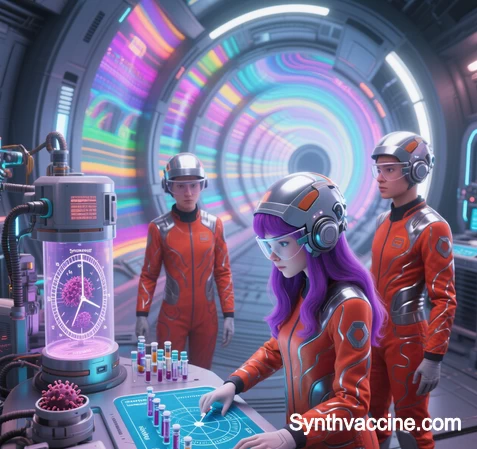 1. AI-Driven Design: Precision and Personalization
1. AI-Driven Design: Precision and Personalization
Computational vaccinology will dominate synthetic vaccine development, leveraging deep learning to:
- Predict immunodominant epitopes with 90% accuracy via neural networks trained on pathogen genomes and immune receptor databases.
- Design stabilized antigen variants resistant to conformational changes (e.g., β-methyl amino acid substitutions in cancer neoantigens).
- Generate personalized multi-epitope scaffolds from tumor exome sequencing data within 72 hours .
Suggested Figure 1: AI Vaccine Design Workflow
Pathogen/tumor sequence → Deep learning epitope prediction → Structural stabilization → Nanoparticle assembly.
(Colors: Pathogen=red, AI core=purple, epitopes=gold, nanoparticle=blue)
2. Platform Technologies: Modularity and Speed
A. Next-Generation Nucleic Acid Platforms
- Self-Amplifying RNA (saRNA): Redoses required by 10× while maintaining efficacy .
- Lyophilized mRNA: Stable at 25°C for 18 months, eliminating cold-chain needs .
- DNA Origami Carriers: Precisely arrange antigens to mimic viral geometry, boosting B-cell activation .
B. Synthetic Biology Toolkits
| Technology | Function | Impact |
|---|---|---|
| SpyTag/SpyCatcher | Plug-and-display multiepitope assembly | 5× faster production vs. traditional conjugation |
| Virus-Like Particles (VLPs) | Self-assembling nanocages displaying antigens | Mimic pathogen size/structure for potent immunity |
| Codon-Deoptimization | Synthetic attenuation of viruses via synonymous mutations | Safer live-vectored vaccines |
Suggested Figure 2: Modular Vaccine Assembly
SpyTagged epitopes (gold) covalently linking to SpyCatcher-ferritin nanocages (blue).
3. Disease Target Expansion
| Application | Innovation | Pipeline Status |
|---|---|---|
| Cancer | Neoantigen RNA-LNPs + STING agonists | 12 Phase II trials (e.g., BioNTech FixVac) |
| Neurodegenerative | Aβ/Tau peptide vaccines with TLR4 adjuvants | Preclinical proof-of-concept |
| Addiction | Hapten-carrier conjugates (e.g., nicotine-KLH) | Phase I for cocaine addiction |
| Universal Pathogens | Conserved coronavirus fusion peptide vaccines | 90% cross-variant protection in primates |
4. Manufacturing Revolution
A. Distributed Production Networks
- Microfactories: Tabletop mRNA synthesizers producing 10,000 doses/day in regional hubs .
- Continuous Flow Systems: Integrated microfluidics enabling end-to-end production in <7 days .
B. Quality Control 2.0
- Machine Learning: Predicts sterility failures from metabolite signatures (50% QC time reduction) .
- Real-Time Potency Assays: CRISPR-based biosensors quantify antigen expression in 2 hours .
Suggested Figure 3: Distributed Manufacturing Model
Global network of microfactories (gold) supplying vaccines via drone delivery (blue).
5. Clinical Delivery Breakthroughs
- Microneedle Patches: Pain-free self-administration; 30-day stability at 40°C .
- Oral Nucleic Acid Formulations: Gut-targeted LNPs surviving acidic environments .
- Smart Implants: Subdermal devices releasing booster doses triggered by cytokine surges .
6. Market and Regulatory Evolution
| Trend | Projection (2030) | Drivers |
|---|---|---|
| Global Market | $75B (40% CAGR) | Pandemic preparedness, cancer applications |
| Regulatory Pathways | AI-validated “rolling approvals” | Real-time manufacturing data sharing |
| Therapeutic Dominance | 60% of pipeline vs. 30% prophylactic | Personalized cancer/autoimmune vaccines |
Conclusion
Synthetic vaccines are poised to redefine 21st-century medicine through:
- Precision-Engineered Immunogens: AI-designed epitopes with cross-reactive immunity.
- Democratized Manufacturing: Distributed microfactories enabling rapid pandemic response.
- Disease Agnosticism: From infectious diseases to cancer and neurodegeneration.
- Patient-Centric Delivery: Thermostable formats and self-administered platforms.
As platform technologies mature, synthetic vaccines will transition from reactive tools to proactive shields—enabling universal vaccine access and heralding an era of “immunological precision medicine.”
Data Source: Publicly available references.
Contact: chuanchuan810@gmail.com
